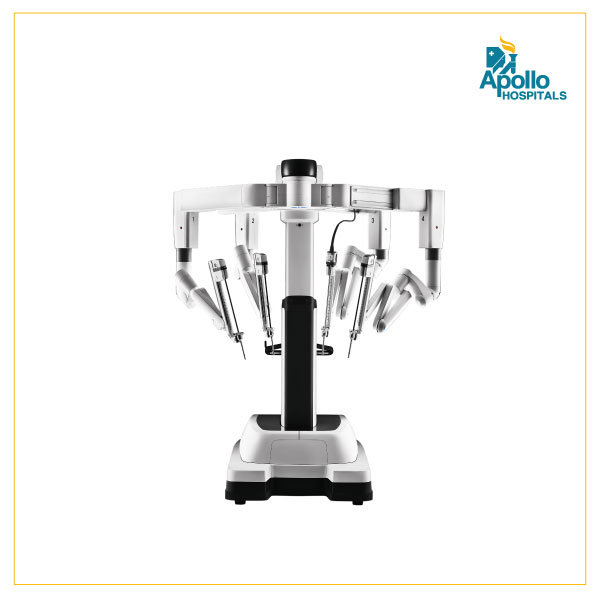Advanced robotically assisted minimally invasive surgery for bladder cancer
- 1027 Views
- Apollo Hospital Mumbai
- May 29, 2023
- Oncology

Verified by: Dr. Ashwin Tamhankar – Consultant, Uro Oncologist and Robotic Surgeon, Apollo Cancer Centers Navi Mumbai
Robotic surgery is a minimally invasive surgical technique that involves the use of robotic arms and a high-definition camera to perform surgical procedures. In the field of urological oncology, robotic surgery has been widely adopted for the treatment of bladder cancer (particularly muscle-invasive), prostate cancer and kidney cancer, as it offers several advantages over traditional open surgery, including reduced blood loss, shorter hospital stays, and faster recovery times. Today, we will discuss the role of robotic surgery in the treatment of bladder cancer.
What is bladder cancer?
Bladder cancer develops in the cells of the urinary bladder, which is a hollow organ located in the lower abdomen that stores urine. The most common type of bladder cancer is urothelial carcinoma, which develops in the lining of the bladder. Smoking is a major factor in the incidence of bladder cancer in India.
Role of robotically assisted minimally invasive surgery in bladder cancer
Treatment for muscle-invasive bladder cancer typically involves the surgical removal of the bladder (Radical Cystectomy), followed by chemotherapy prior or after surgery. Surgery entails removal of the bladder & the prostate gland in males, and the bladder & uterus along with ovaries in females. After removal, urinary diversion needs to be done, which is exclusively available at Apollo Hospitals Navi Mumbai through robotic surgery (Intracorporeal Urinary Diversion).
Robotic surgery offers several advantages over traditional open surgery for bladder cancer:
- Reduced blood loss, thereby avoiding blood transfusions
- Less or no pain
- Smaller incisions/skin cut (minimally invasive)
- Faster recovery time through Enhanced Recovery After Surgery (ERAS) protocol
- Quicker return to normal activities
- Precise surgical movements, with 3D magnified vision
What happens during robotic surgery?
- During robotic surgery for bladder cancer, the surgeon sits at a console and controls the robotic arms, which are equipped with surgical instruments. All movements are completely performed by the surgeon.
Consult the best Uro Oncologist in Mumbai for robotic bladder cancer surgery.
- The robotic arms are inserted into the patient’s body through small incisions, and a high-definition camera provides the surgeon with a detailed view of the surgical site.
- The surgeon uses robotic arms to remove the bladder and surrounding tissue, and the surgical site is then closed using small stitches or staples.
The outcomes of such a major surgery depend upon consistent surgical team & high-volume center with multidisciplinary team (Surgical, Uro-oncology, medical oncology, radiation oncology, pathology & radiology) approach. However, it is important for patients to discuss the potential risks and benefits of robotic surgery with their healthcare provider before making a decision about treatment.
Apollo Hospitals Navi Mumbai offers the best robotic cancer treatment in Mumbai and is equipped with the latest and the most advanced 4th Generation Da Vinci Xi Robotic System for the surgical management of bladder cancers. We have successfully managed over 100 complex and rare urological cancers as well as other forms of cancers with the help of our advanced robot.
Connect with us on 022 6280 6280 or visit Apollo Hospitals Navi Mumbai for more details.
Dr. Ashwin Tamhankar
Consultant, Uro Oncologist and Robotic Surgeon, Apollo Cancer Centers Navi Mumbai
- December 26, 2024
Robotic Surgery in Orthopedics
- December 26, 2024
Revolutionizing GI and HPB Surgery: The Role of Robotics
- December 26, 2024
COPD: A Chronic Respiratory Challenge
- December 26, 2024
What is Minimal Access Hernia Surgery and Why is it Beneficial?
- December 26, 2024
New Advances in Diabetes Management: A Brighter Future for Patients
- November 25, 2024
Multiple Sclerosis (MS): Early Detection and Treatment Matter
- Bone Marrow Transplant3
- Cardiac sciences44
- Child Care7
- Clinical Excellence33
- Cosmetology2
- COVID-199
- Diseases4
- Emergency8
- Emergency10
- Endocrinology1
- ENT5
- Fetal Medicine1
- Gastroenterology8
- General Medicine11
- General Surgery4
- Genomic Medicine2
- Gynecology1
- Health14
- Hematology2
- Kidney Transplant5
- Kidney Transplant2
- Liver Transplant6
- Neonatology1
- Nephrology2
- Nephrology & transplant1
- Nephrology & Urology4
- Neurosciences1
- Neurosciences21
- Nutrition/Diet1
- Obstetrics & Gynecology9
- Obstetrics & Gynecology4
- Oncology92
- Oncology3
- Ophthalmology1
- Orthopedic14
- Patient Speak1
- Pediatric Surgery4
- physiotherapy2
- Psychologist2
- Pulmonology3
- Rheumatology1
- Robotic Suregry1
- Robotic Surgery11
- Spine1
- Uncategorized111
- Women Care5
